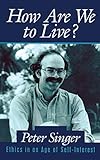How are we to live? : ethics in an age of self-interest / Peter Singer.
Material type: TextPublication details: Oxford, N.Y. : oxford university press, 1993.Description: xvii, 318 p. ; 23 cmISBN:
TextPublication details: Oxford, N.Y. : oxford university press, 1993.Description: xvii, 318 p. ; 23 cmISBN: - 0879759666 (pbk.)
- BJ1012 .S56 1993
 Book
Book
| Current library | Collection | Call number | Copy number | Status | Barcode | |
|---|---|---|---|---|---|---|
| Bishop Okullu Memorial Library (Limuru Campus) General Circulation | Non-fiction | BJ1012 .S56 1993 (Browse shelf(Opens below)) | 1 | Available | 024267 | |
| Nairobi Campus General Circulation | Non-fiction | BJ1012 .S56 1993 (Browse shelf(Opens below)) | 2 | Available | 024297 |
Browsing Bishop Okullu Memorial Library (Limuru Campus) shelves, Shelving location: General Circulation, Collection: Non-fiction Close shelf browser (Hides shelf browser)

|

|

|

|

|

|
No cover image available No cover image available | ||
| BJ1012.R27 2010 The Elements of Moral Philosophy | BJ1012 .R37 1972 Moral decision | BJ1012.R54 1982 Right conduct : | BJ1012 .S56 1993 How are we to live? : | BJ1012 .T47 1980 Ethics : | BJ1012 .W55 1981 Moral luck : | BJ1025 .E95 1953 Ethics. |
Includes bibliographical references and index.
Singer suggests that people who take an ethical approach to life often avoid the trap of meaninglessness, finding a deeper satisfaction in what they are doing than those people whose goals are narrower and more self-centered. He spells out what he means by an ethical approach to life and shows that it can bring about significant and far-reaching changes to one's life.
How Are We to Live? explores the way in which standard contemporary assumptions about human nature and self-interest have led to a world that is fraught with social and environmental problems. Singer asks whether selfishness is in our genes and concludes that we do not have to accept the bleak view of human nature sometimes believed to be inevitable, given our evolutionary origins.
There are no comments on this title.
